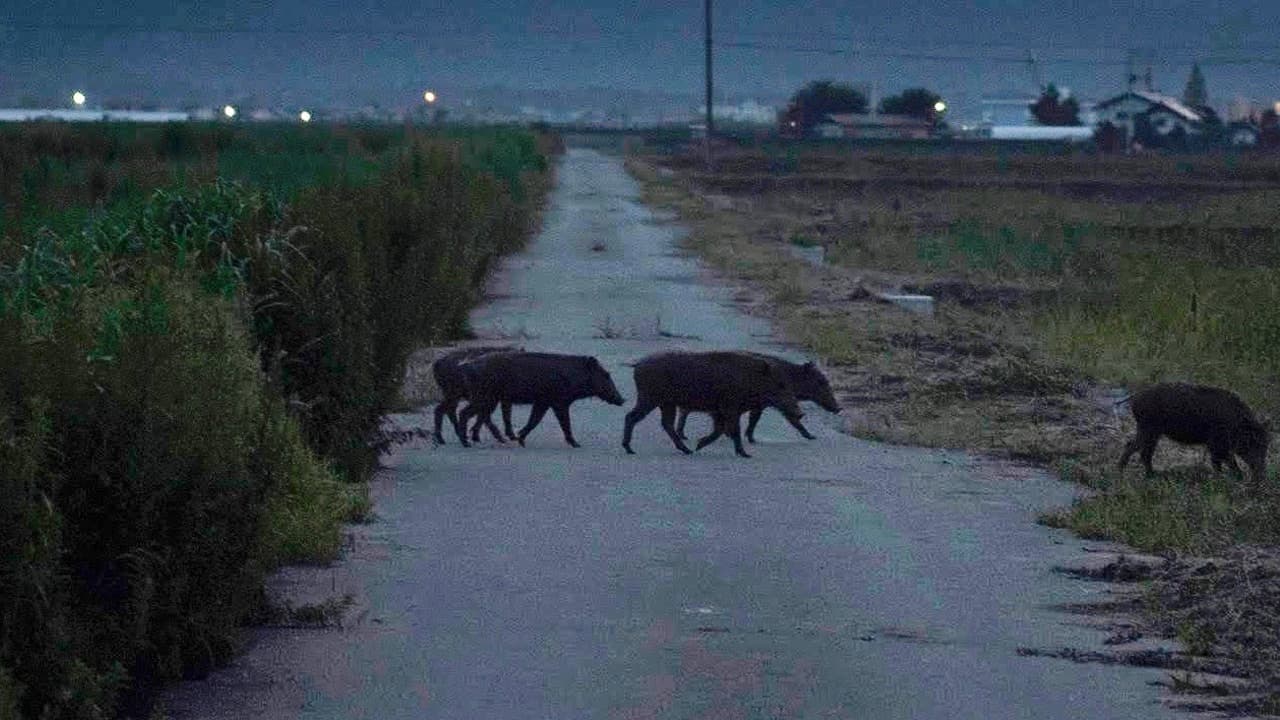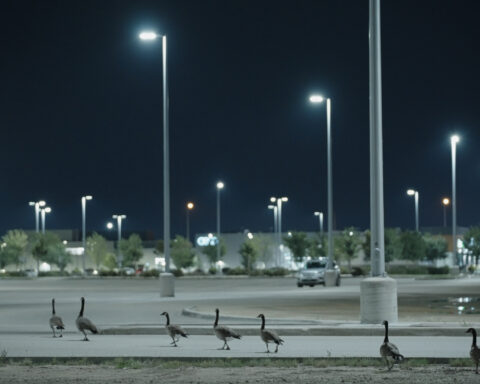“I’d like things to go back to the way they were before,” says a resident of a nuclear accident site in The Toxic Pigs of Fukushima. What seems like an obvious statement stings with a painful familiarity in the thick of the COVID-19 crisis. A film about life in the ruins of a biohazardous disaster, which will soon be available via VICE, has eerie parallels to the way the world feels mid-pandemic.
The Toxic Pigs of Fukushima is an ambient short doc that captures life in the aftermath of the Fukushima Daiichi nuclear disaster. It’s been nearly a decade since an earthquake and subsequent tsunami disturbed the nuclear power reactor near the towns of Ōkuma and Futaba, in the Fukushima Prefecture of Japan. While the Japanese government is eager to usher people back to living in the area, most stay away, fearing for their health. The film quietly follows the few people that remain alongside countless radiation-ridden boars that roam free.
The film hitches a ride with a dutiful boar-hunter, tasked by the government to track and kill the hordes of radiated pigs that have descended upon Fukushima and multiplied in the accident’s aftermath. “Because pigs are omnivores, and they’ll eat everything, they’re actually an interesting benchmark for the health of the ecosystem,” said director Otto Bell in an interview with POV. Though the garbage-eating creatures earn the title of the film, it’s not entirely a story about pigs. It’s also about people.
While the central character, Goru-san the boar-hunter, acts as a lonesome guide to Fukushima, he’s not entirely alone in this setting that seems post-apocalyptic. There’s a divorced man who walks the camera through the ruins of his once-young family’s dream starter home. A farmer combs for remnants of his dead daughter in the fields. A woman knits full sized dolls in lieu of human company.
They paint a picture of the type of person who stays behind after a disaster. “They felt forgotten by the government and had resigned themselves to living a half-life in a changed landscape,” said Bell. “Many of them said to me, ‘Old age will get me before the radiation does. This is where my ancestors are from, and this is where I want to remain and be buried.’”
The Toxic Pigs of Fukushima pads out these devastating moments with ‘pillow shots’ of the empty streets and the meandering boars, a technique inspired by Japanese director Yasujirō Ozu. There’s an eerily peaceful sense of repetition as Goru-san methodically hunts the boars, dragging their carcasses quietly along the floor of the forest. “I think the boars are a through-line in the film that allows us to tap into a variety of human experiences,” said Bell.
The animals served a very practical purpose as well. Local authorities were anxious and hesitant to allow filming so making a doc that followed the wild animals allowed them to fly under the radar. “I don’t know that we would have been afforded the same level of access had we not already built a relationship with the hunters who were sanctioned to go to all of these off-limit areas,” said Bell.
Access wasn’t the only challenge. Filming in an area poisoned with radiation required incredible diligence against an invisible threat, not unlike filming during COVID. Bell recalls wearing Geiger counters and full Tyvec suits to roam the deserted streets. The danger is palpable, as studies report high incidences of cancer in the region. Goru-san the boar-hunter has since passed away after a battle of his own.
The ambient, echoing soundtrack, boxed-in aperture, and desolate landscape shots all contribute to replicate the “oppressive nature of radiation that you feel in the atmosphere and do not see,” Bell said. The emptiness of the streets, the presence of an invisible threat – it all feels very reminiscent to the photos and videos that circulated during the initial lockdowns in March and April of 2020.
Watching Toxic Pigs in the context of the pandemic feels different than watching Chernobyl on a lazy afternoon in 2019 before heading out for drinks with your friends. It is hauntingly familiar, but not in a way that detracts from the devastating emotional impact of the film. If anything, it heightens it.
The atmospheric short film is a departure from Bell’s previous doc, The Eagle Huntress, which was criticized by some for feeling too manipulated, too sculpted. It’s evident that whether or not Bell took it to heart, he certainly took this into consideration for his latest film. The Eagle Huntress received a BAFTA nomination for Best Feature Documentary and landed a spot on the Oscar shortlist, just as Toxic Pigs could when the Academy announces its shortlists on February 9.
“There’s a director I really admire, and she told me you can make two different kinds of films: you can make a film that tells people what to think, or you can make a film that tells people what to think about,” said Bell. “It was more the latter in the case of Toxic Pigs.”
This approach lent itself well to the subject matter of Toxic Pigs. The film is more a series of thought-provoking vignettes than a doc that takes everything and wraps it up in a neat little bow. It is sparse on figures and numbers, has no talking heads in sight, and immerses you in the atmosphere of Fukushima for a long, melancholy 35 minutes.
“It was deliberately designed to be a head-scratcher about what the hell is going on here, and in doing so, hopefully have people think more about the balance between nature and mankind’s progress with things like nuclear power,” said Bell. “Where does that balance lie?”
The Toxic Pigs of Fukushima will be released as part of the upcoming VICE series The Short List with Suroosh Alvi.












